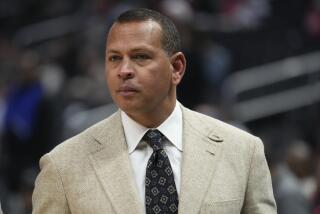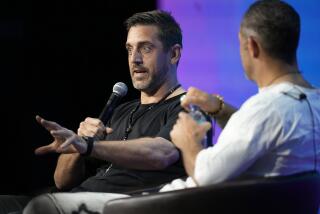Mark McGwire finally admits to using steroids throughout his career
- Share via
A recluse no more, Mark McGwire finally talked about the past, admitting what virtually everyone in baseball suspected for years, that he used steroids during his 16-year career, including the memorable 1998 season in which he and Sammy Sosa revitalized the game with their Great Home Run Chase.
What Congress couldn’t coax out of McGwire under oath in 2005, an impending return to baseball as the St. Louis Cardinals’ hitting coach -- and the questions that would no doubt dog him in his return to the public eye -- could.
The former Oakland Athletics and Cardinals slugger, who retired in 2001 after hitting 583 home runs, sent a statement to the Associated Press on Monday apologizing for his steroid use and later fought back tears during an hourlong interview on the Major League Baseball Network.
“It’s very emotional, it’s telling family members, friends and coaches ... that I’m coming clean and being honest,” McGwire, now 47, told the AP. “It’s the first time they’ve ever heard me talk about this. I hid it from everybody.”
In the MLB Network interview, filmed at his Newport Beach home, McGwire said he “wished steroids never came into my life. I apologize to everyone in MLB, my family, the [Roger] Maris family, [Commissioner] Bud Selig. Today was the hardest day of my life.”
McGwire, a former La Verne Damien High School and USC star, also said he used human growth hormone, a performance-enhancing drug that baseball still does not test for, “once or twice.”
He tried steroids for the first time after the 1989 season but began using them “on a consistent basis” after the 1993 season. He turned to steroids, he said, in hopes of healing quicker from his numerous injuries and proving he was worth his huge salary.
“You don’t know that you’ll ever have to talk about the skeleton in your closet on a national level,” he said. “I did this for health purposes. There’s no way I did this for any type of strength use.”
One former major league pitcher begs to differ. McGwire was a lean, 6-foot-5, 225-pound rookie when he hit 49 homers in 1987, but within a few years, he bulked up considerably, to at least 250 pounds, and used his massive arms and legs to power balls into the outer reaches of stadiums.
“I think most people who hear that will roll their eyes,” former Angels pitcher Brian Anderson, who spent 12 years in the major leagues, said of McGwire’s admission. “He said he took steroids for over a decade -- look at the size of him, for crying out loud.
“The balls he hit defied reality. He was an absolute monster. I saw him hit a ball off the top of the Budweiser sign behind the left-field bleachers at [Cleveland’s] Jacobs Field. He hit one out of [Arizona’s] Bank One Ballpark in batting practice. There was no doubt his strength was off the charts.”
Could McGwire have hit a then-record 70 home runs in 1998 without steroids?
“Absolutely,” McGwire said. “There’s not a pill or an injection that will give an athlete the hand-eye coordination to hit a baseball.”
Of course, baseballs flew out of parks at an alarming rate during “the steroid era,” which included most of the 1990s and ran into this last decade.
Before Barry Bonds hit his record 73 homers in 2001, the height of the era was 1998, when McGwire and Sosa mashed their way through a summer in which they revived a sport still reeling from the strike that wiped out the 1994 World Series.
McGwire finished with 70 homers; Sosa had 66. When McGwire broke Maris’ record of 61 homers, he crossed home plate, lifted his son, Matt, then a Cardinals batboy, into his arms and hugged members of the Maris family sitting near the Cardinals’ dugout.
One of McGwire’s calls Monday was to Pat Maris, the widow of Roger Maris, the former New York Yankees slugger.
“She was disappointed,” McGwire said. “She has every right to be. I couldn’t tell her how sorry I was. . . . I wish I had never touched steroids. It was foolish, and it was a mistake. . . .
“I never knew when, but I always knew this day would come. It’s time for me to talk about the past and to confirm what people have suspected.”
McGwire refused to answer questions during a congressional hearing about whether he used illegal steroids on March 17, 2005.
“I’m not here to talk about the past,” McGwire said repeatedly, his reputation seemingly taking a beating every time he uttered the phrase.
McGwire said Monday that he was prepared to talk about his steroid use before Congress, that he “wanted to get it off my chest,” but when he was not granted immunity from prosecution before the hearing, his lawyers advised him to take the approach he did.
McGwire went into a self-imposed baseball exile until he was hired in October by his former manager and one of his biggest supporters, Tony La Russa, to be the Cardinals’ hitting coach, a move that McGwire said prompted Monday’s admission.
“After all this time, I want to come clean,” he said. “I was not in a position to do that five years ago in my congressional testimony, but now I feel an obligation to discuss this and to answer questions about it. I’ll do that, and then I just want to help my team.”
McGwire said he “hoped the truth would set me free,” but it probably won’t help his Hall of Fame candidacy. In four appearances on the ballot, McGwire’s vote totals have hovered around 23%, well below the 75% necessary for induction.
“I think anyone deemed to have used steroids does not belong in the Hall of Fame,” said former pitcher Rich “Goose” Gossage, who was enshrined in Cooperstown in 2008. “It’s a pristine club, and it’s not fair to all the other guys who did it the natural way, with their God-given ability.
“I think a lot of positive things will come out of his admission, but just because you’re telling the truth now doesn’t give you a free ticket to the Hall.”
McGwire went on the disabled list seven times and missed 228 games during a five-year period in the mid-1990s, and injuries led to his retirement, at age 38, in 2001. He is tied for eighth on baseball’s all-time homer list, and his average of one homer every 10.6 at-bats is the best ever.
McGwire is the second major baseball star in a year to admit to using illegal steroids, following Yankees slugger Alex Rodriguez’s admission last February. La Russa and Selig praised McGwire’s decision to go public.
“His willingness to admit mistakes, express his regret, and explain the circumstances that led him to use steroids add to my respect for him,” the manager said.
Added Selig: “This statement of contrition, I believe, will make Mark’s reentry into the game much smoother and easier.”
Since the congressional hearing in 2005, baseball has toughened its drug program twice, increasing the penalty for a first steroid offense from 10 days to 50 games.
“If we had drug-testing,” McGwire said, “I never would have used steroids.”
More to Read
Go beyond the scoreboard
Get the latest on L.A.'s teams in the daily Sports Report newsletter.
You may occasionally receive promotional content from the Los Angeles Times.











